The second commitment in Our Common Agenda is about protecting the planet. This means zero carbon dioxide emissions by 2050 or earlier, declaring a global climate emergency, and that no new coal-fired power plants will be built after 2021. In addition, the global food system will be transformed to operate within the planetary boundaries. In this work, the Rockefeller Foundation, EAT, Club of Rome and the head of the Potsdam Institute, Johan Rockström, have important roles to play. However, the commitment and the global emergency are ultimately about protecting the economic interests of the global elites and to implement the technocratic Fourth Industrial Revolution. This means total digitisation and fake meat on the menu.
Planetary Emergency
The proclamation of an emergency is partly reminiscent of the scenario “Fortress World” from the Global Scenario Group’s report The Great Transition – The Promises and Lures of Our Times published in 2002 by the Stockholm Environment Institute in Boston under the leadership of Club of Rome member Paul Raskin.
The forces of global order take action. International military, corporate, and governance bodies, supported by the most powerful national governments, form the selfstyled Alliance for Global Salvation. Using a revamped United Nations as their platform, a state of planetary emergency is declared. A campaign of overwhelming force, rough justice and draconian police measures sweeps through hot spots of conflict and discontent.
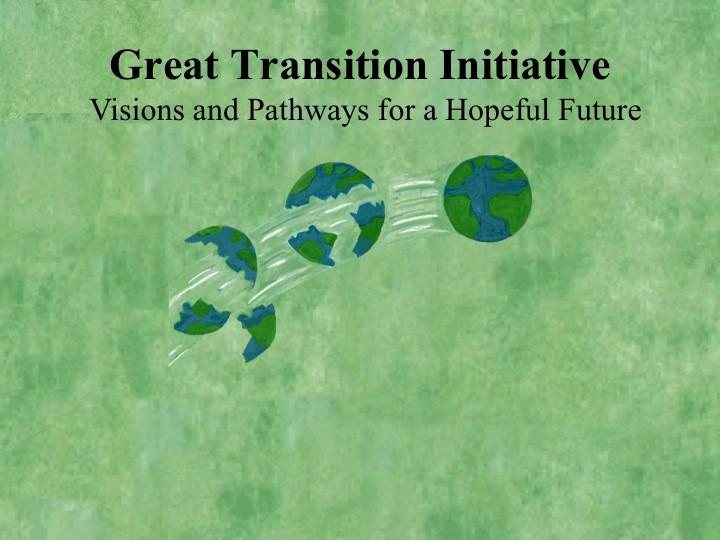
The Global Scenario Group was initiated by Earth Charter Chairman Steven Rockefeller and funded by UNEP, Rockefeller Foundation and Nippon Foundation to explore how a global ideal society could be realized based on Agenda 21 and the Earth Charter. Reviewers included IPCC’s first chairman Bert Bolin and Gordon Goodman from the Stockholm Environment Institute. The latter had, on the advice of the Rockefeller Brothers Fund, included the climate issue in the Brundtland report Our Common Future. (Read more about The Great Transition in my books The Global Coup D’état and Rockefeller – Controlling the Game).
A similar call can be traced back to the G8 summit in Gleneagles in 2005, hosted by World Economic Forum acolyte Tony Blair, when a memo, Global Warning, written by psychoanalyst David Wasdell, circulated among the participants with the advise to declare a global emergency. This memo was also disseminated through Wasdell to the members of the Club of Rome.[1] It was a dramatic message to quickly put a comprehensive plan into action.
We have a narrow remaining window to engage global strategic planning and mobilisation, followed by a maximum of fifty years to achieve the transition, to scale down resource usage, to terminate inequetable capital accumalation and begin the long time reduction of global population.
A climate emergency later (2018) became part of Club of Rome’s agenda through their Climate Emergency Plan.[2] It was presented in expanded form in September the following year during the UN climate conference in New York as The Planetary Emergency Plan. The main authors were Club of Rome’s chairman Sandrine Dixson-Declève, former chairman Anders Wijkman and the Potsdam Institute’s newly appointed head Johan Rockström. The latter had made a rocket career after being headhunted in 2003 as director of the Stockholm Environment Institute by Bert Bolin and has been given one of the main roles in the implementation of the great transformation (SRC Decennial Report).
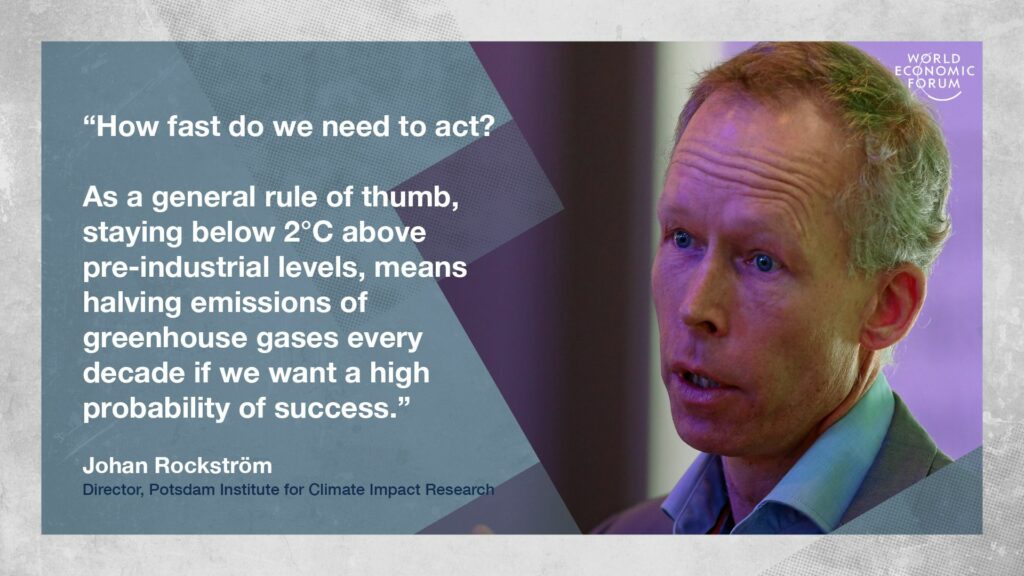
The Club of Rome and Rockström believed that the new decade needed to be a turning point to avoid disaster. The Declaration of Planetary Emergency would ensure that all actions from 2020 would be aligned to insure the stability of Earth’s life supporting systems.
Club of Rome then created, together with, among others, the Potsdam Institute, WWF and The Global Commons Alliance, The Planetary Emergency Platform. A partnership, led by the Swiss institute Climate & Sustainability, which in collaboration with both the UN and the World Economic Forum focuses on persuading leaders to implement a “healthy, green and fair recovery”.[3]
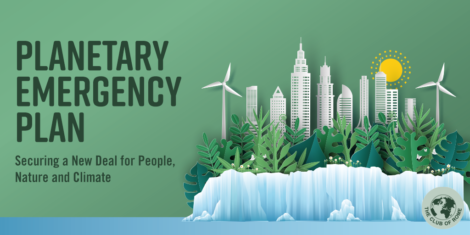
Concrete examples of measures were to influence the G20 finance ministers and, together with Aavaz (led by WEF Young Global Leader Ricken Patel), forming a “civic movement” that could ask Christine Lagarde (European Central Bank), Ursula von der Leyen and Angela Merkel for a green recovery (Green Deal). Basically, this means creating a “public opinion” to influence themselves. (This form of astroturfing in order to legitimise for one’s own agenda is a not an unusual method in big politics.)
On May 1st, 2019, the Welsh Parliament was the first to declare a “climate emergency”. Six months later, a “state of emergency” was declared by the European Parliament after lobbying from the Club of Rome.
Now it’s the United Nation’s turn. In connection with the UN climate panel IPCC releasing its Sixth Assessment Report: Mitigating Climate Change on April 4, 2022, Antonio Guterres stated:
This is a climate emergency. Climate scientists warn that we are already perilously close to tipping points that could lead to cascading and irreversible climate impacts.[4]
Energy Transition
Guterres uses the same dramatic wording about the climate that has been used repeatedly by Johan Rockström and others over the past 20 years.[5] A radical conversion of the energy system to zero emissions is something that Guterres, the Club of Rome and the IPCC all see as essential. To achieve this, extensive digitisation and electrification are advocated, among other things.
Digital technologies can contribute to mitigation of climate change and the achievement of several SDGs (high confidence). For example, sensors, Internet of Things, robotics, and artificial intelligence can improve energy management in all sectors, increase energy efficiency, and promote the adoption of many low-emission technologies, including decentralised renewable energy, while creating economic opportunities.[6]
In various ways, we must also be persuaded to reduce our transport-related emissions. According to the IPCC, this can be achieved by raising the cost of fuel, using “smart” car sharing and through Supply Chain Management. Other methods, such as teleworking and digitisation, could be tested on a large scale in connection with the COVID-19 lockdowns. However, this had only a short-term effect on emissions during the first phase of the pandemic. To the UN, this indicates that stricter measures are needed in order to achieve the goals.
As early as 2010, the European Climate Foundation, led by Jules Kortenhorst (formerly McKinsey and Royal Dutch Shell), presented the Roadmap 2050 report to the then European Commissioner for Climate Action, Connie Hedegaard. The aim was to support the EU’s climate and energy goals and reduce carbon dioxide emissions by 80–95% by 2050. The ECF was founded in 2008 by eight US foundations to “activate political commitment and awareness of the global emergency” and create a society without greenhouse gas emissions. Today, the foundation is funded by, among others, Stiftung Mercator, Rockefeller Brothers Fund, IKEA Foundation, Growald Family Fund and Bloomberg Philanthropies. Former Commissioner Hedegaard currently sits on the board of the European Climate Foundation and is a member of one of the ECF’s former beneficiaries, the Club of Rome. Several of the Club’s members, such as Anders Wijkman and Hans Joachim Schellnhuber, have over the years served as advisors.
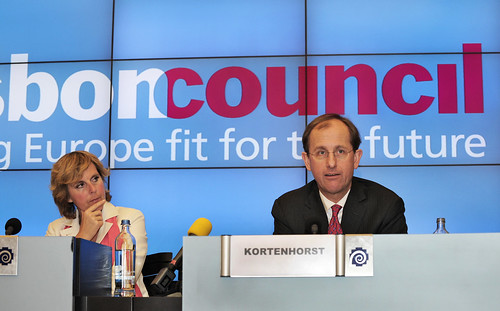
During the UN General Assembly 2021, a High Level Dialogue on Energy was organised with 130 global leaders, which established a global roadmap for energy supply with the aim of achieving zero carbon dioxide emissions by 2050. This is linked to SDG 7 – Sustainable energy for all – and to the fulfilment of the Paris Agreement.[7] Jules Kortenhorst, who is now the director of the Rocky Mountain Institute, was one of the participants. In connection with the meeting, five thematic reports were also released on how the energy transition is intended to be carried out.[8]
This roadmap advocates a phasing out of coal use by 2030 for OECD countries and by 2040 for other countries. At the same time, a universal access to energy is promised, which is an equation that seems difficult (if not impossible) to implement without fossil energy sources. In 2020, coal accounted for 27.2% of energy supply, oil 31.2%, natural gas 24.7% and nuclear power 4.3%, while renewable energy sources (including hydropower) accounted for only 12.6%.
The Rockefeller Foundation, which is part of two of the UN’s five working groups, has nevertheless taken on the task and formed, in connection with the UN climate meeting in Glasgow (COP26) in November 2021, the partnership Global Energy Alliance for People & Planet to promote goal number 7. The alliance also includes partners such as the World Bank, Jeff Bezos Earth Fund and the IKEA Foundation.[9]
According to Rockefeller Foundation, affluent countries have spent many billions on vaccinating their citizens and at the same time changing their economies to become more digital (which for RF is the same as climate-friendly). However, the poor countries have ended up in the backwaters and in other words need Rockefeller Foundation’s “benevolent assistance”. The goal is to help developing countries create energy projects that can be “aggregated, replicated, and scaled – reducing carbon emissions, expanding energy access, and creating green jobs”.
The method is mainly focused on electrification, phasing out fossil energy, utilisation of renewable energy sources and creation of small distribution networks (distributed renewable energy technologies). This is to be achieved by exploiting the potential of Artificial Intelligence, solar power and batteries. At the same time, millions of new jobs are promised. How realistic this is remains to be seen (if it sounds too good to be true, it often is).
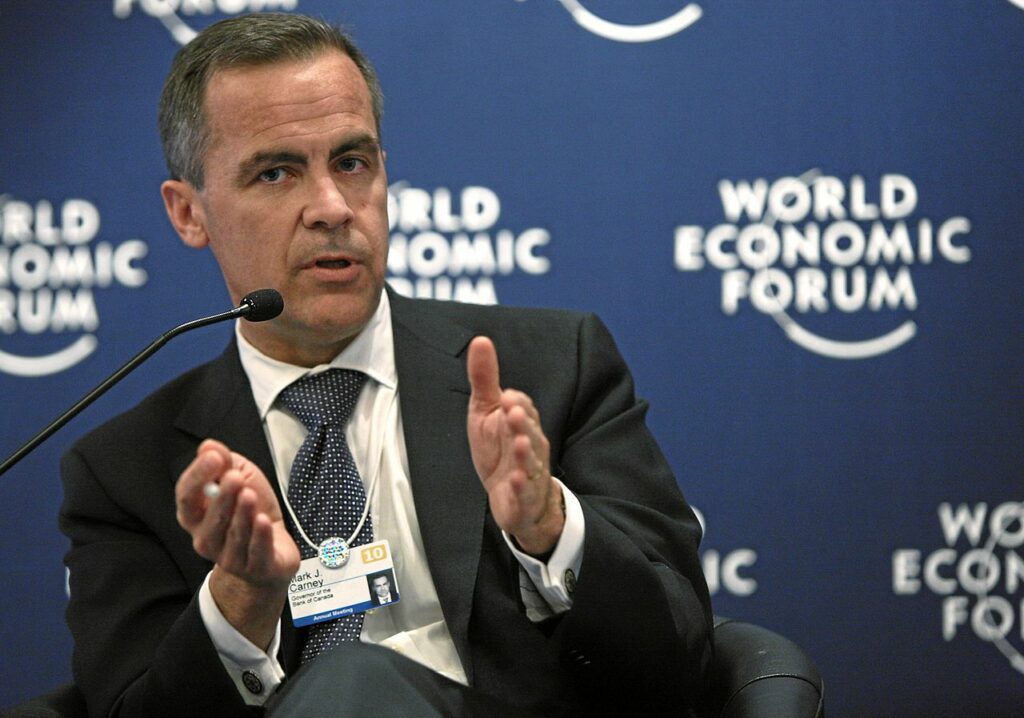
At the same meeting,The Glasgow Financial Alliance for Net Zero was created under the leadership of the UN Special Envoy for Climate Action and Finance, Mark Carney. He is a heavyweight in the banking sector, is a member of Group of 30, a board member of the World Economic Forum and was between 2013-2020 head of the British central bank Bank of England. Leadership is shared with former New York Mayor Mike Bloomberg, philanthropist and owner of the Bloomberg Media Group.[10]
Their Principals Group is led by Nili Gilbert (WEF Young Global Leader) of the David Rockefeller Fund and lists members such as BlackRock’s Larry Fink, Bank of America CEO Brian Moynihan and Al Gore’s weapon bearer from Generation Investment Management, David Blood. This is an association that represents the most economically powerful forces in the world and we once again see the World Economic Forum, BlackRock and the Rockefeller philanthropies in the driver’s seat.
The Alliance has been united in order to “accelerate the decarbonisation of the global economy”. This means a reform of financial rules to support the transition to a carbon-neutral economy, the phasing out of subsidies for fossil fuels, pricing of carbon dioxide emissions, mandatory conversion plans and climate reporting for public and private companies.
Larry Fink writes in his annual CEO letter that “the decarbonisation of the global economy will create the greatest investment opportunity in our lifetime”. These include the extensive electrification and digitalisation of the world.
At the same time, preparations have been made by the World Economic Forum’s think tank Global Future Council on Energy Transition and the working group Shaping the Future of Energy, Materials and Infrastructure. In the former, Jules Kortenhorst was chairman until 2020 together with representatives from Royal Dutch Shell, BlackRock and China National Petroleum Company. The latter includes companies such as Bahrain Petroleum, BP, Chevron, Crescent Petroleum, Occidental, Petrobras, SaudiAramco, Shell Oil, Suncor and Total. These are energy companies that base most of their operations on the exploitation of hydrocarbons. It does not seem very likely that they would voluntarily give up their business in order to switch to developing only renewable energy solutions.
Many analysts believe instead that the whole thing aims to shift to a greater dependence on natural gas, which is something that oil companies such as Royal Dutch Shell and natural gas-producing nations can capitalise on. Natural gas is seen as a transitional solution. The shift from coal to natural gas has taken place in both the United States and Europe.[11]
It has also meant that Europe has become increasingly dependent on natural gas from Russia, as renewable energy alone cannot meet the needs as more and more coal-fired power plants (and nuclear power plants) are shut down.
Gas is the big “wildcard”, in particular for use in electric power. With the right technologies and policies, total demand for gas could grow substantially. (Transformation of the Global Energy System)
A central part of the transition is an electrification of pretty much everything. This is also a part of the digital transition where everything must be interconnected and where consumption must be able to be measured and controlled with the help of smart electricity networks. This is a priority for the World Economic Forum, which is reflected in their reports on the energy transition. This also applies to the UN.
Better systems of data collection and application that are open, reliable, and complete are necessary to accelerate the effective development of inclusive energy policy, planning, and systems. Digitalization and Industry 4.0 technologies can also act as enablers for transformational change..[12]
It is also about building a completely new infrastructure that enables the smart city with “shared mobility” and self-driving cars.
These are exciting times in which new technologies allow people to rethink the way they live in a more sustainable and efficient manner. Smart mobility. Smart water. Smart grid. Smart integration. These are the foundations of tomorrow’s cities, which are being realized today.[13]
In addition, it is a matter of the energy system being linked to the financial system. The new economic technocratic system is intended to be based on energy consumption and carbon dioxide credits. That this system will rely entirely on renewable energy currently seems utopian and highly unlikely. Instead, electrification and digitisation are the main goal.
A transition of the energy system, together with a global health architecture and the digital transformation, are the main priorities for the G20 this year. While COVID-19 was the trigger for a new health system, the war in Ukraine has in a very clear way raised the energy issue. In addition, there is the question of how to handle an impending food crisis.
History is truly at a turning point. We do not yet know the full extent of the systemic and structural changes which will happen. However, we do know that global energy systems, food systems and supply chains will be deeply affected. (Klaus Schwab, World Government Summit 2022)
Food System Transition
A transformed food system was one of the points raised by the UN in October 2019 when “The Decade of Action” was declared. This also made an impression in Davos a few months later when Johan Rockström participated in the WEF panel New Agenda on Food.[14]
Rockström had previously been part of the Lancet-EAT commission’s project Food in the Anthropocene, which pointed out how the food system must be able to feed an increasing population with a healthy diet while being sustainable and not a burden on the planet.[15]
There is no silver bullet for combatting harmful food production practices, but by defining and quantifying a safe operating space for food systems, diets can be identified that will nurture human health and support environmental sustainability.[16]
EAT Foundation was founded by the Norwegian Stordalen Foundation, Stockholm Resilience Center and Wellcome Trust to be a catalyst for a transformed food system. The board includes Gunhild Stordalen (WEF Young Global Leader) Johan Rockström from the Potsdam Institute and Lee Howell from World Economic Forum.[17] Rockström and Stordalen are also part of the Food System Economics Commission , which was started by EAT, PIK and The Food and Land Use Coalition with funding from the Rockefeller Foundation, IKEA and Wellcome Trust. These actors form the core of the transformative agenda and have accepted the call to educate others what we need to eat to stay within the planetary boundaries.
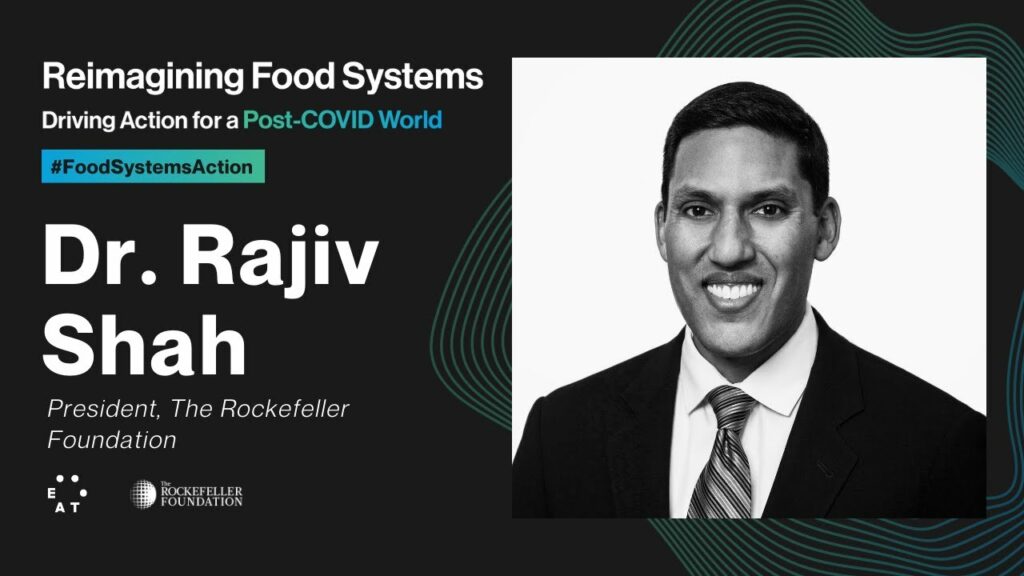
On June 24, 2020, EAT and the Rockefeller Foundation organised “Reimagining Food Systems: Driving Action for a Post-COVID World.” The conference, which virtually gathered 2,000 participants, pointed to a unique opportunity to transform the food system in the wake of the global crisis caused by the pandemic. As Rockefeller Foundation’s CEO Rajiv Shah (WEF Young Global Leader) stated during the introductory speech:
We believe today’s crisis, brought about by a health pandemic that’s caused a hunger pandemic, can actually be an opportunity to drive through desperately needed changes that can make our food system more equitable, more nourishing and more sustainable.[18]
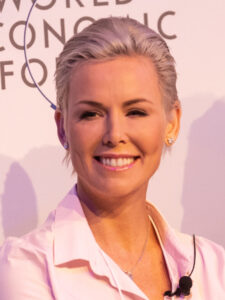
Gunhild Stordalen said that the old food system was broken and that our only choice is to “build back better, together” while Johan Rockström presented the need for a planetary emergency to implement important system changes and give us “a planetary health diet future for all” .
According to Rockström, this means a food system that follows “The Carbon Law” and thereby reduces carbon dioxide emissions by half every ten years. This is, according to him, the scientific path for keeping warming below two degrees Celsius.[19]
The meeting was attended by several participants who would participate in the UN’s forthcoming food conference. This included Agnes Kalibata, head of the Rockefeller Foundations and the Bill & Melinda Gates Foundation’s Alliance for a Green Revolution in Africa (AGRA) project, who had been appointed UN Special Envoy for the conference.[20] She echoed the message of “build back better”.
The Food Systems Summit was held during UN Week in September 2021. The aim was to “solve not only hunger, but also to reduce diet-related diseases and heal the planet.”
The conference advisory group was chaired by UN Deputy Secretary-General Amina Mohammed (Member of the Board of WEF Young Global Leaders) and included names such as Christine Gould from Thought for Food and Ruth Richardson from the Global Alliance for the Future of Food.[21] These two initiatives also had close links to the Rockefeller Foundation.
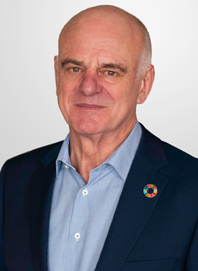
Twelve out of eighteen from the UN Advisory Panel have also participated in the World Economic Forum as panelists or “Agenda Contributors.”
One of the key players is Dr. David Nabarro, the UN’s former Agenda 2030 coordinator who led the WHO’s work to reform the organization’s handling of disease outbreaks and emergencies and who in 2017 ran for the post of Secretary General of the WHO. In January 2020, he was named Special Envoy on COVID-19 for the WHO. He is an example of how close the health and food agendas are to each other.
Nabarro, who heads the Institute of Global Health Innovation at Imperial College and is the strategic director of 4SD (a Swiss institute that works with system change and where Nabarro trains leaders to achieve the global goals), is also an advisor to the EAT Foundation and participated in “Reimagining Food Systems: Driving Action for a Post-COVID World”. Now he has gone from having a leading role in pandemic management to, together with Johan Rockström and Gunhild Stordalen, leading the work of creating a new “sustainable” food system.
[Agenda2030] is not an optional agenda. This is compulsory. It is the key to survival of the planet and humanity. (David Nabarro)
The war in Ukraine has made their work highly topical.[22] One of the priorities is to persuade consumers to reduce their consumption of meat and animal fats in favour of plant-based diets and synthetic meat substitutes (alternative proteins). With the help of social media and influencers, perceptions of what food is enjoyable can also be “transformed”. As the article “Here’s a simple way to convince people to eat less meat” from the World Economic Forum describes it:
You will be surprised how much positive impact plant-based food can have on both the planet and your health. Choose plant-based dishes to lower your carbon footprint and improve nutrition. It’s about goodness for you and the planet.[23]
WEF’s think tank Global Future Council on Food Security and Agriculture and working group Shaping the Future of Food have focused on this.[24] Both groups include the agenda-setting actors Rockefeller Foundation, Wellcome Trust and EAT Foundation. It is also about how new technology should change the food system.
We aim to explore new ways to feed an expanding populace, to use technology and innovation to provide nourishment without harming the planet, and to foster public-private partnerships that can help prevent non-communicable diseases..[25]
As early as 2017, the World Economic Forum published the report Shaping the Future of Global Food Systems: A Scenarios Analysis with financial support from the Rockefeller Foundation, Wellcome Trust and the Dutch and Canadian governments.[26] The report, with four scenarios for the future, considers that the current food system is not effective and that a comprehensive transformation is necessary. This includes, among other things, an application of the techniques of the fourth industrial revolution (FoodTech).
CRISPR technology could reinvent seeds, big data and ICT could allow for more efficient and climate-smart farming practices, robotics could increase efficiencies in harvest and processing, sensors could reduce waste dramatically in transportation, artificial intelligence could revolutionize retail models, and personalized nutrition could reshape consumers’ preferences and behaviours..[27]
This is also described in the report Innovation with a Purpose. This report describes twelve 4IR technologies that will restructure the food system and help meet global goals.
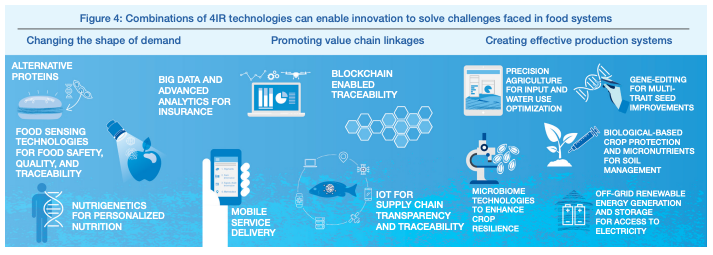
This includes various alternative proteins such as Protix insect burgers and Impossible Foods plant-based “fake burgers”.
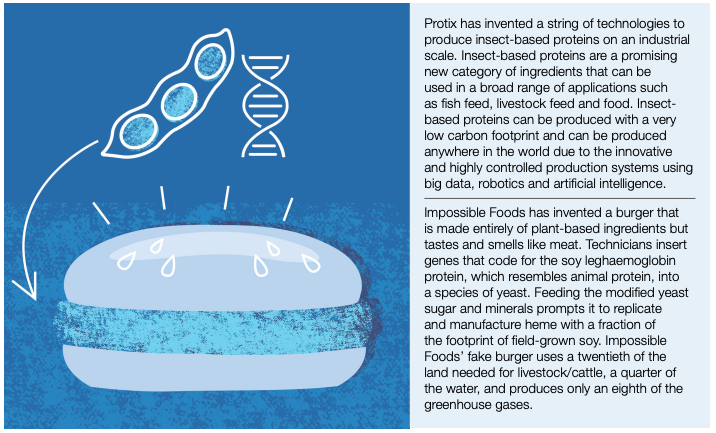
It is not a question of any natural food. It is more like an alchemical playhouse and a total technification of all processes., e.g. lab-grown meat and 3D-printed food.
Some of the partners who want to change our behaviour in order to “shape the future we want” are: Cocal Cola, Pepsi, Bayer, Syngenta, Monsanto, Cargill, DuPont, Unilever, Nestlé and Hewlett Packard.
The question is how healthy their solution really is? Where the pandemic served the interests of the pharmaceutical industry, it is agrobusiness and their innovative start-up companies with laboratory-produced fake food on the menu that are in turn to increase their cash flows through the escalating food crisis. All to save the planet and keep us within Rockström’s planetary boundaries.
In the next article, I will look at the third commitment – Promote peace and prevent conflicts. This means, among other things, how space technology is planned to monitor carbon dioxide emissions.
Jacob Nordangård, PhD Technology and Social Change
© Stiftelsen Pharos 2022. May not be republished without permission (contact us) but feel free to share.
Read more about World Economic Forum, Agenda 2030, and the Fourth Industrial Revolution in Rockefeller – Controlling the Game
Support our work! Now we need, among other things, help with financing the publication of the English edition of The Global Coup d’état and a paperback version of this series of articles.
This is third article in the 13-part series about the 12 commitments in Our Common Agenda. See also:
Introduction: Our Common Agenda – Multilateralism With Teeth
References
[1] Read more about Wasdell in Rockefeller – Controlling the Game
[2] Club of Rome (2018), The Climate Emergency Plan
[3] Climate & Sustainability (2020), Planetary Emergency Partnership
[4] United Nations (2022), Secretary-General Warns of Climate Emergency, Calling Intergovernmental Panel’s Report ‘a File of Shame’, While Saying Leaders ‘Are Lying’, Fuelling Flames, Pressrelease 4 april 2022
[5] The expression “Tipping Points” was first used by David Wasdell in his report Beyond the Tipping point with Hans Joachim Schellnhuber as co-author.
[6] IPCC (2022), Climate Change 2022, Mitigation of Climate Change, Summary for Policymakers
[7] United Nations (2021), Global Roadmap for Accelerated SDG7 Action in Support of the 2030 Agenda for Sustainable Development and the Paris Agreement on Climate Change
[8] United Nations (2021), High-level Dialogue on Energy, New York, September 2021, Theme Reports
[10] Also a member of the Trilateral Commission and Council on Foreign Relations.
[11] Rooney, Catherine (2021), This is how the US energy market is shifting, World Economic Forum
[12] United Nations (2021), Theme Report on Innovation, Technology and Data, Secretariat of the High-level Dialogue on Energy 2021, Division for Sustainable Development Goals Department of Economic and Social Affairs United Nations
[13] World Economic Forum (2018), Electric Vehicles for Smarter Cities: The Future of Energy and Mobility
[14] World Economic Forum (2020), Press Conference: New Agenda on Food – Launching a Decade of Action
[15] EAT, The EAT-Lancet Commission Commissioners
[16] Stockholm Resilience Center (2019), The planetary health diet
[17] EAT, Board of Trustees
[18] Rockefeller Foundation (2020), The Rockefeller Foundation and EAT Co-host “Reimagining Food Systems: Driving Action for a Post-COVID World”, Press Release 26 juni 2020,
[19] Johan Rockström, Plan & Vision: A Plan for the Planet, EAT
[20] Rockefeller Foundations och Bill & Melinda Gates Foundations projekt Alliance for a Green Revolution in Africa (AGRA)
[21] United Nations (2021), Food Systems Summit, Leadership
[22] Headey, Derek (2022), Russia’s war on Ukraine is creating a global food crisis. Here are 3 ways to tackle it, World Economic Forum
[23] Torkington, Simon (2022), Here’s a simple way to convince people to eat less meat, World Economic Forum
[24] World Economic Forum, Shaping the Future of Food
[25] World Economic Forum, Agriculture, Food and Beverage
[26] World Economic Forum, Shaping the Future of Global Food Systems: A Scenarios Analysis
[27] Ibid.
 Pharos
Pharos
For about the last one thousand years, the Earth in it’s great celestial orbit, has been in the location where an Ice Age is always experienced, it is thought to be “imminent”. This is undeniable fact, and no amount of human intervention will change it. Please ask yourselves; why is this information being suppressed?
[…] Quelle: 2. Protect the Planet – A Planetary Emergency | Pharos […]